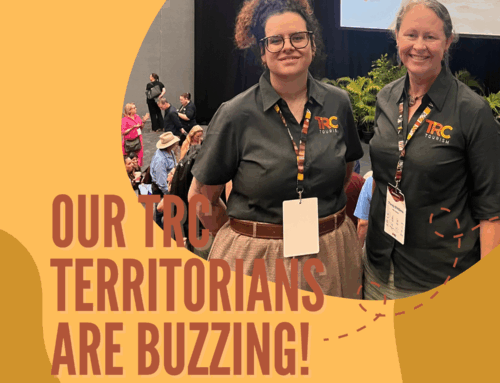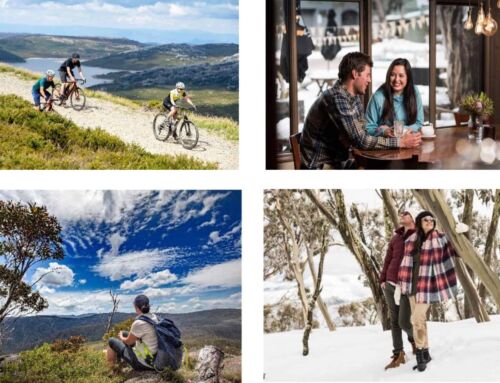Chris Halstead, a Senior Consultant at TRC Tourism, brings over 25 years of experience in sustainable visitor experiences, particularly in trail development and eco-tourism. Recently returning from Egypt, he shares his exciting journey on the Sinai Trail, Egypt’s inaugural long-distance hiking route. This trek was a standout experience in his three-week adventure across Egypt and Jordan.
Before undertaking the Sinai Trail Chris explored alongside his wife, Heather, a master’s student in Ancient Archaeology some of Egypt’s lesser-known archaeological wonders, including the Sacred Animal Necropolis at North Saqqara, where mummified baboons and ibis can be seen within an almost endless labyrinth of tunnels.

Customary welcome and tea with a Sinai well digger
The Birth of the Sinai Trail: A Journey Beyond Borders
Launched in 2015, the Sinai Trail sinaitrail.net embarked as a 220km route, a 12-day odyssey from the Gulf of Aqaba to the summit of Jebel Katherina, Egypt’s highest peak. Fuelled by the passion of three Bedouin tribes, the trail quickly gained global acclaim, earning the title of the best new tourism project at the British Guild of Travel Writers Tourism Awards in 2016. Wanderlust and Outdoors magazines further solidified its status in 2017, ranking it among the world’s best new trails.
Following two more years of work and thousands of kilometres of exploration on foot, the three Bedouin tribes who began the trail worked with other, new tribes to extend the route. Today, the Sinai Trail spans 550km, taking 54 days to complete, involving eight tribes in an exploration of the breathtaking landscapes within the Sinai region.

Some sand walking on the edge of the biggest sand desert in South Sinai
A Cultural Revival: Eight Tribes, One Trail
Eight Bedouin tribes—Tarabin, Muzeina, Jebeleya, Awlad Said, Gararsha, Sowalha, Hamada, and Alegat—now work collectively on the Sinai Trail, reviving historical alliances. Decisions are made collectively, each tribe responsible for guiding through its territory, echoing a tradition over a century old.
The trail is more than a physical journey; it’s a cultural renaissance. Bedouin tribes, their knowledge endangered by modernity, find a living legacy in the Sinai Trail. The program’s success depends on the world knowing about it, urging every hiker to share their experiences, pictures, and stories, ensuring the Sinai’s hidden beauty is unveiled to the world.

Pharaonic temple Serabit el Khadem which was considered an alternate candidate for Mt. Sinai
Trekking the Sinai: A Transformative Experience
Chris’s initial plan to explore the Red Sea Mountain trails shifted to the Sinai Trail due to restrictions on overnight hiking. Through the official Sinai Trail guide company, Chris connected with Youssuf Barakat, whose family has been guiding caravans for generations.
Together with two hard working Bedouin assistants they navigated the high country and wadis in the Sinai winter, fortunately avoided the recent snow and rain, unveiling ancient turquoise mines, Pharaonic temples, and the biggest sand desert in South Sinai. Chris set out on a 100km stretch from Beit Barakat to Serabit el Khadem, to St. Katherine a 5 day journey through high mountains, deep gorges, and remote wadis.
Bedouin guides, mandatory for the trek, offer not just navigation but a living connection to the region’s history. Well-versed in first aid, they are trained by accredited professionals and Bedouin elders, ensuring a safe and authentic experience. The Sinai Trail, in its essence, becomes a bridge between generations, passing on the knowledge of the Bedouin’s old ways, water sources, legends, and tribal history.
The trek, set against the backdrop of turmoil in Gaza, highlighted the resilience of the Bedouin tribes, especially in South Sinai where once again they are weathering tourism downturns. Youssuf and his family showcase the Sinai’s beauty, create jobs for their tribesmen, and pass down invaluable knowledge to future generations.

Youseff exploring the ancient Nabatean trader’s village
St. Katherine: A Tapestry of Ancient and Modern
The 100-kilometer trek concluded in St. Katherine, featuring the iconic ascent of Jabel Katherina, also known as Mount Sinai. St. Katherine offered comfort and evidence of a rapidly developing modern regional town which paled compared to the nights spent camping amidst the rugged mountains and Wadis of the Sinai.
Reflecting on his experience, Chris remarked, “the nights camping in the mountains and wadis of the Sinai was something special and I will forever remember the hospitality of Bedouin shepherds and travellers and their customary welcome and tea along the way.”
Winding through 550 kilometres of history and culture, the Sinai Trail stands as a testament to the enduring resilience and unity of the Bedouin tribes who contribute not just to tourism but to the preservation of an ancient way of life. The Sinai Trail, weaving through the heart of Egypt’s untamed landscapes, stands as a beacon, inviting the world to discover the hidden wonders of the Sinai.

Leaving the wadis on the climb to St Katherine

Sinai pre-dawn light






